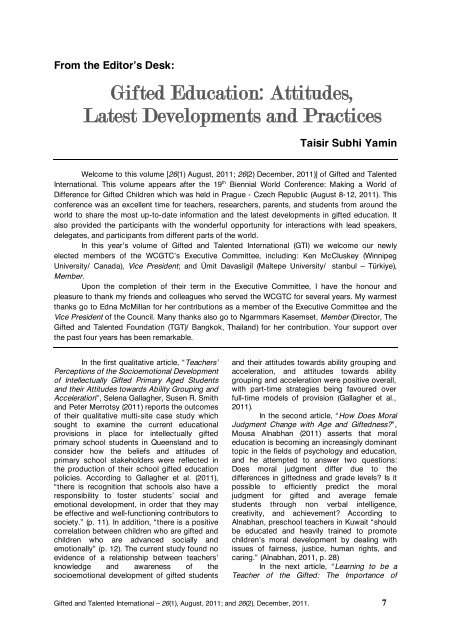The Journal of the World Council for Gifted and Talented Children
The Journal of the World Council for Gifted and Talented Children
The Journal of the World Council for Gifted and Talented Children
Create successful ePaper yourself
Turn your PDF publications into a flip-book with our unique Google optimized e-Paper software.
From <strong>the</strong> Editor’s Desk:<br />
����������������<br />
�����������<br />
������ ������������ �����������<br />
Taisir Subhi Yamin<br />
Welcome to this volume [26(1) August, 2011; 26(2) December, 2011)] <strong>of</strong> <strong>Gifted</strong> <strong>and</strong> <strong>Talented</strong><br />
International. This volume appears after <strong>the</strong> 19 th Biennial <strong>World</strong> Conference: Making a <strong>World</strong> <strong>of</strong><br />
Difference <strong>for</strong> <strong>Gifted</strong> <strong>Children</strong> which was held in Prague - Czech Republic (August 8-12, 2011). This<br />
conference was an excellent time <strong>for</strong> teachers, researchers, parents, <strong>and</strong> students from around <strong>the</strong><br />
world to share <strong>the</strong> most up-to-date in<strong>for</strong>mation <strong>and</strong> <strong>the</strong> latest developments in gifted education. It<br />
also provided <strong>the</strong> participants with <strong>the</strong> wonderful opportunity <strong>for</strong> interactions with lead speakers,<br />
delegates, <strong>and</strong> participants from different parts <strong>of</strong> <strong>the</strong> world.<br />
In this year’s volume <strong>of</strong> <strong>Gifted</strong> <strong>and</strong> <strong>Talented</strong> International (GTI) we welcome our newly<br />
elected members <strong>of</strong> <strong>the</strong> WCGTC’s Executive Committee, including: Ken McCluskey (Winnipeg<br />
University/ Canada), Vice President; <strong>and</strong> Ümit Davasligil (Maltepe University/ stanbul – Türkiye),<br />
Member.<br />
Upon <strong>the</strong> completion <strong>of</strong> <strong>the</strong>ir term in <strong>the</strong> Executive Committee, I have <strong>the</strong> honour <strong>and</strong><br />
pleasure to thank my friends <strong>and</strong> colleagues who served <strong>the</strong> WCGTC <strong>for</strong> several years. My warmest<br />
thanks go to Edna McMillan <strong>for</strong> her contributions as a member <strong>of</strong> <strong>the</strong> Executive Committee <strong>and</strong> <strong>the</strong><br />
Vice President <strong>of</strong> <strong>the</strong> <strong>Council</strong>. Many thanks also go to Ngarmmars Kasemset, Member (Director, <strong>The</strong><br />
<strong>Gifted</strong> <strong>and</strong> <strong>Talented</strong> Foundation (TGT)/ Bangkok, Thail<strong>and</strong>) <strong>for</strong> her contribution. Your support over<br />
<strong>the</strong> past four years has been remarkable.<br />
In <strong>the</strong> first qualitative article, “Teachers’<br />
Perceptions <strong>of</strong> <strong>the</strong> Socioemotional Development<br />
<strong>of</strong> Intellectually <strong>Gifted</strong> Primary Aged Students<br />
<strong>and</strong> <strong>the</strong>ir Attitudes towards Ability Grouping <strong>and</strong><br />
Acceleration”, Selena Gallagher, Susen R. Smith<br />
<strong>and</strong> Peter Merrotsy (2011) reports <strong>the</strong> outcomes<br />
<strong>of</strong> <strong>the</strong>ir qualitative multi-site case study which<br />
sought to examine <strong>the</strong> current educational<br />
provisions in place <strong>for</strong> intellectually gifted<br />
primary school students in Queensl<strong>and</strong> <strong>and</strong> to<br />
consider how <strong>the</strong> beliefs <strong>and</strong> attitudes <strong>of</strong><br />
primary school stakeholders were reflected in<br />
<strong>the</strong> production <strong>of</strong> <strong>the</strong>ir school gifted education<br />
policies. According to Gallagher et al. (2011),<br />
“<strong>the</strong>re is recognition that schools also have a<br />
responsibility to foster students’ social <strong>and</strong><br />
emotional development, in order that <strong>the</strong>y may<br />
be effective <strong>and</strong> well-functioning contributors to<br />
society.” (p. 11). In addition, “<strong>the</strong>re is a positive<br />
correlation between children who are gifted <strong>and</strong><br />
children who are advanced socially <strong>and</strong><br />
emotionally” (p. 12). <strong>The</strong> current study found no<br />
evidence <strong>of</strong> a relationship between teachers’<br />
knowledge <strong>and</strong> awareness <strong>of</strong> <strong>the</strong><br />
socioemotional development <strong>of</strong> gifted students<br />
<strong>and</strong> <strong>the</strong>ir attitudes towards ability grouping <strong>and</strong><br />
acceleration, <strong>and</strong> attitudes towards ability<br />
grouping <strong>and</strong> acceleration were positive overall,<br />
with part-time strategies being favoured over<br />
full-time models <strong>of</strong> provision (Gallagher et al.,<br />
2011).<br />
In <strong>the</strong> second article, “How Does Moral<br />
Judgment Change with Age <strong>and</strong> <strong>Gifted</strong>ness?”,<br />
Mousa Alnabhan (2011) asserts that moral<br />
education is becoming an increasingly dominant<br />
topic in <strong>the</strong> fields <strong>of</strong> psychology <strong>and</strong> education,<br />
<strong>and</strong> he attempted to answer two questions:<br />
Does moral judgment differ due to <strong>the</strong><br />
differences in giftedness <strong>and</strong> grade levels? Is it<br />
possible to efficiently predict <strong>the</strong> moral<br />
judgment <strong>for</strong> gifted <strong>and</strong> average female<br />
students through non verbal intelligence,<br />
creativity, <strong>and</strong> achievement? According to<br />
Alnabhan, preschool teachers in Kuwait “should<br />
be educated <strong>and</strong> heavily trained to promote<br />
children’s moral development by dealing with<br />
issues <strong>of</strong> fairness, justice, human rights, <strong>and</strong><br />
caring.” (Alnabhan, 2011, p. 28)<br />
In <strong>the</strong> next article, “Learning to be a<br />
Teacher <strong>of</strong> <strong>the</strong> <strong>Gifted</strong>: <strong>The</strong> Importance <strong>of</strong><br />
<strong>Gifted</strong> <strong>and</strong> <strong>Talented</strong> International – 26(1), August, 2011; <strong>and</strong> 26(2), December, 2011. 7


